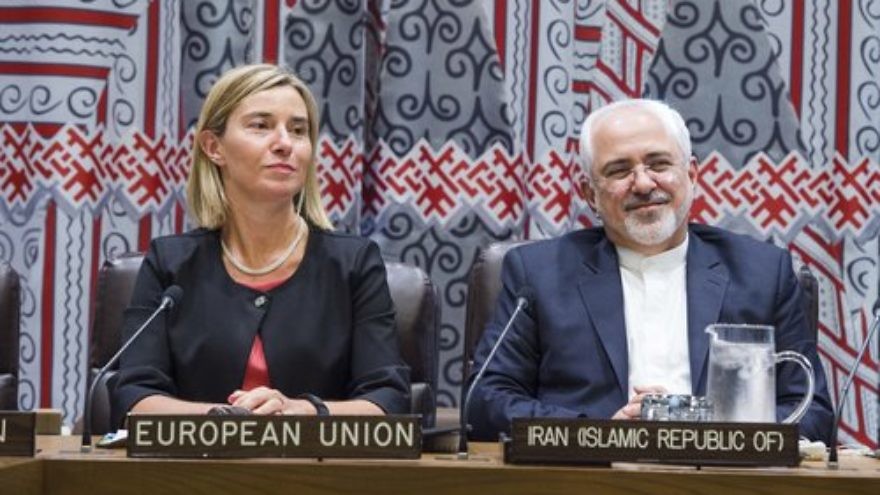Gen. Hossein Salami, the commander-in-chief of Iran’s Islamic Revolutionary Guard Corps, gave a speech last month in which he celebrated Iran’s military might and its goals. As is Tehran’s policy, the IRGC commander refused to use the word “Israel,” but had plenty to say about the Jewish state. According to the state-controlled IRNA news agency, Salami said that 40 years after the Iranian revolution that put the Islamist regime in power, it had “managed to obtain the capacity to destroy the imposter Zionist regime.” And lest anyone think that the amassing of military might was purely defensive in nature, Salami also maintained that, “That sinister regime must be wiped off the map” and this is no longer … a dream.” It was, he boasted, “an achievable goal.”
Salami isn’t the first Iranian leader to make such threats. They have been a staple of Iranian political rhetoric for decades, including from the country’s top ayatollahs who run that theocracy. But the fact that the IRGC—the terrorist group that runs Iran’s international terrorist network, as well as the entity that exercises a great deal of influence over its economy through the companies it owns—is still spouting talk about wiping out the sole Jewish state on the planet does raise some interesting and painfully obvious questions to which there are no good answers.
The first concerns the unwillingness of Iran’s European trading partners to confront the fact that they are still seeking to cultivate good relations with an Iranian regime that embraces genocide of Jews as a legitimate policy goal.
For instance, Germany is working hard to preserve the 2015 nuclear deal that enriched and empowered Tehran while also giving it a path to acquiring weapons that would make good on its threats to wipe Israel off the map.
Nor is Germany alone in that respect. The leading countries of Western Europe are up in arms over the Trump administration’s efforts to isolate Iran and force it to renegotiate the nuclear deal. France recently floated the idea of offering a $15 billion loan to Tehran, which was, in effect, a proposal for a ransom payment that would cause Iran to stop attacking shipping vessels in the Persian Gulf and oil facilities in neighboring countries. Despite Iran’s provocations, the European Union and its foreign-policy minister, Federica Mogherini, speak as if efforts by the United States to end the nuclear threat are the obstacle to peace, rather than a government that remains the world’s leading state sponsor of terrorism and which continues to speak of genocidal attacks on Israel.
Despite the inconsistencies in his foreign policy—with the betrayal of the Kurds to Turkey this week being the most egregious example—President Donald Trump remains the only world leader committed to actually stopping Iran rather than enabling it.
Some in Israel and America were worried by Trump’s refusal to respond with military force to Iran’s provocations and by his willingness to meet with Iranian representatives to talk about strengthening the nuclear deal. But it appears as if Iran now has no intention of talking to Trump. It may be that they were never serious about dialogue, or that the Democrats’ impeachment efforts have convinced them that Trump is doomed to defeat in November 2020. They appear to be listening to the advice of those who have advised them wait until January 2021, when any one of the Democrats running against him will reinstate the disastrous pact promoted by President Barack Obama and lift Trump’s sanctions, which have had a devastating impact on Iran’s economy and its ability to spread terror.
Supporters of Obama’s deal argue that at the time, it was the best way to forestall an imminent Iranian nuclear threat, and that the only alternative was a war that no one wanted. But Trump has proven the falsity of that claim. The alternative to appeasement of Iran is Trump’s policy of “maximum pressure” to strangle the Iranian economy, which will eventually force the Iranians back to the negotiating table. Or at least it would if the West sticks to it, whether or not Trump is in the White House.
While the Democratic presidential field has shown little interest in foreign policy other than to speak of Trump’s unfitness for office, the candidates ought to be asked about what they intend to do about Iran’s continuing genocidal threats and why a pact that offered it a path to a nuclear bomb should be reinstated.
Iran isn’t a normal country, and neither Europe nor America’s opposition party should speak as if it were.
Mere antipathy for Trump and respect for Obama’s legacy isn’t a good-enough answer as to why support for the nuclear deal’s reinstatement is still a consensus issue among Democrats. The same applies to Europe’s belief that the profits it would continue to make from doing business with Tehran is more important than isolating a terror-supporting regime that wants to kill millions of people.

























